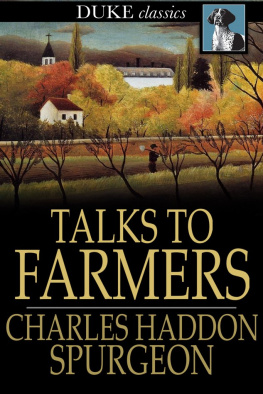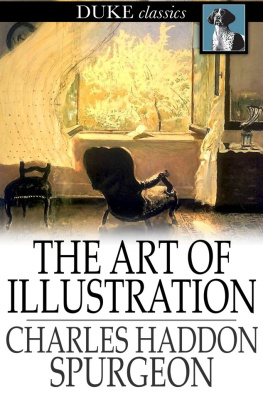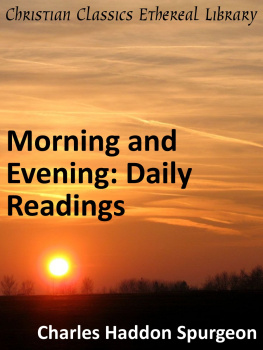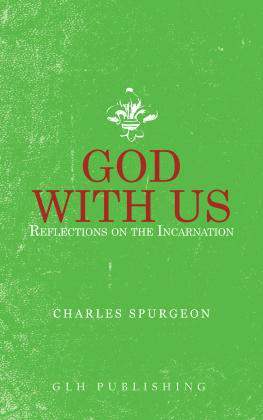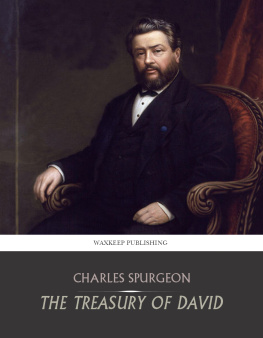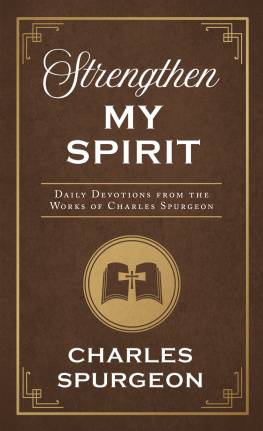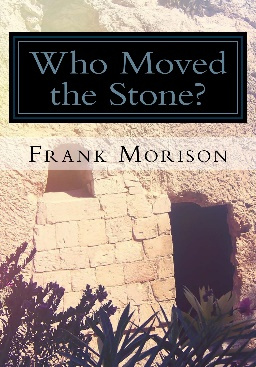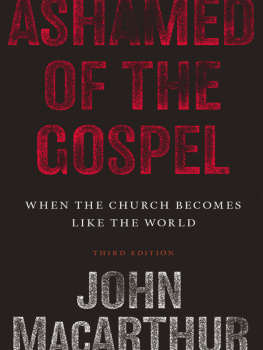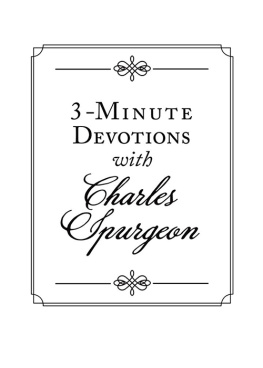Charles Haddon Spurgeon - Talks to Farmers
Here you can read online Charles Haddon Spurgeon - Talks to Farmers full text of the book (entire story) in english for free. Download pdf and epub, get meaning, cover and reviews about this ebook. year: 2013, publisher: Duke Classics, genre: Science. Description of the work, (preface) as well as reviews are available. Best literature library LitArk.com created for fans of good reading and offers a wide selection of genres:
Romance novel
Science fiction
Adventure
Detective
Science
History
Home and family
Prose
Art
Politics
Computer
Non-fiction
Religion
Business
Children
Humor
Choose a favorite category and find really read worthwhile books. Enjoy immersion in the world of imagination, feel the emotions of the characters or learn something new for yourself, make an fascinating discovery.
- Book:Talks to Farmers
- Author:
- Publisher:Duke Classics
- Genre:
- Year:2013
- Rating:4 / 5
- Favourites:Add to favourites
- Your mark:
- 80
- 1
- 2
- 3
- 4
- 5
Talks to Farmers: summary, description and annotation
We offer to read an annotation, description, summary or preface (depends on what the author of the book "Talks to Farmers" wrote himself). If you haven't found the necessary information about the book — write in the comments, we will try to find it.
Pastor Charles Haddon Spurgeon was one of the most popular religious speakers of his era, and by some estimates, he preached to ten million followers over the course of his career. Spurgeon made it his mission to speak to people from all walks of life. This collection brings together some of the homilies he presented to farmers and agricultural laborers, but the themes will resonate for all faithful seekers.
Talks to Farmers — read online for free the complete book (whole text) full work
Below is the text of the book, divided by pages. System saving the place of the last page read, allows you to conveniently read the book "Talks to Farmers" online for free, without having to search again every time where you left off. Put a bookmark, and you can go to the page where you finished reading at any time.
Font size:
Interval:
Bookmark:

First published in 1889
ISBN 978-1-62013-439-9
Duke Classics
2013 Duke Classics and its licensors. All rights reserved.
While every effort has been used to ensure the accuracy and reliability of the information contained in this edition, Duke Classics does not assume liability or responsibility for any errors or omissions in this book. Duke Classics does not accept responsibility for loss suffered as a result of reliance upon the accuracy or currency of information contained in this book.
"I went by the field of the slothful, and by the vineyard of the manvoid of understanding; And, lo, it was all grown over with thorns, andnettles had covered the face thereof, and the stone wall thereof wasbroken down. Then I saw, and considered it well: I looked upon it, andreceived instruction."PROVERBS 24:30-32.
No doubt Solomon was sometimes glad to lay aside the robes of state,escape from the forms of court, and go through the country unknown. Onone occasion, when he was doing so, he looked over the broken wall of alittle estate which belonged to a farmer of his country. This estateconsisted of a piece of ploughed land and a vineyard. One glance showedhim that it was owned by a sluggard, who neglected it, for the weeds hadgrown right plentifully and covered all the face of the ground. Fromthis Solomon gathered instruction. Men generally learn wisdom if theyhave wisdom. The artist's eye sees the beauty of the landscape becausehe has beauty in his mind. "To him that hath shall be given," and heshall have abundance, for he shall reap a harvest even from the fieldthat is covered with thorns and nettles. There is a great differencebetween one man and another in the use of the mind's eye. I have a bookentitled, "The Harvest of a Quiet Eye," and a good book it is: theharvest of a quiet eye can be gathered from a sluggard's land as well asfrom a well-managed farm. When we were boys we were taught a littlepoem, called, "Eyes and no Eyes," and there was much of truth in it, forsome people have eyes and see not, which is much the same as having noeyes; while others have quick eyes for spying out instruction. Some lookonly at the surface, while others see not only the outside shell but theliving kernel of truth which is hidden in all outward things.
We may find instruction everywhere. To a spiritual mind nettles havetheir use, and weeds have their doctrine. Are not all thorns andthistles meant to be teachers to sinful men? Are they not brought forthof the earth on purpose that they may show us what sin has done, and thekind of produce that will come when we sow the seed of rebellion againstGod? "I went by the field of the slothful, and by the vineyard of theman void of understanding," says Solomon; "I saw, and considered itwell: I looked upon it, and received instruction." Whatever you see,take care to consider it well, and you will not see it in vain. Youshall find books and sermons everywhere, in the land and in the sea, inthe earth and in the skies, and you shall learn from every living beast,and bird, and fish, and insect, and from every useful or useless plantthat springs out of the ground.
We may also gather rare lessons from things that we do not like. I amsure that Solomon did not in the least degree admire the thorns and thenettles that covered the face of the vineyard, but he nevertheless foundinstruction in them. Many are stung by nettles, but few are taught bythem. Some men are hurt by briers, but here is one who was improved bythem. Wisdom hath a way of gathering grapes of thorns and figs ofnettles, and she distils good from herbs which in themselves are noisomeand evil. Do not fret, therefore, over thorns, but get good out of them.Do not begin stinging yourself with nettles, grip them firmly, and thenuse them for your soul's health. Trials and troubles, worries andturmoils, little frets and little disappointments, may all help you ifyou will. Like Solomon, see and consider them welllook upon them, andreceive instruction.
As for us, we will now, first, consider Solomon's description of asluggard: he is "a man void of understanding"; secondly, we shallnotice his description of the sluggard's land: "it was all grown overwith thorns, and nettles had covered the face thereof." When we haveattended to these two matters we will close by endeavoring to gatherthe instruction which this piece of waste ground may yield us.
First, think of SOLOMON'S DESCRIPTION OF A SLOTHFUL MAN. Solomon was aman whom none of us would contradict, for he knew as much as all of usput together; and besides that, he was under divine inspiration when hewrote this Book of Proverbs. Solomon says, a sluggard is "a man void ofunderstanding." The slothful does not think so; he puts his hands in hispockets, and you would think from his important air that he had all theBank of England at his disposal. You can see that he is a very wise manin his own esteem, for he gives himself airs which are meant to impressyou with a sense of his superior abilities. How he has come by hiswisdom it would be hard to say. He has never taken the trouble tothink, and yet I dare not say that he jumps at his conclusions, becausehe never does such a thing as jump, he lies down and rolls into aconclusion. Yet he knows everything, and has settled all points:meditation is too hard work for him, and learning he never could endure;but to be clever by nature is his delight. He does not want to know morethan he knows, for he knows enough already, and yet he knows nothing.The proverb is not complimentary to him, but I am certain that Solomonwas right when he called him "a man void of understanding." Solomon wasrather rude according to the dainty manners of the present times,because this gentleman had a field and a vineyard, and as Poor Richardsaith, "When I have a horse and a cow every man biddeth me good morrow."How can a man be void of understanding who has a field and a vineyard?Is it not generally understood that you must measure a man'sunderstanding by the amount of his ready cash? At all events you shallsoon be flattered for your attainments if you have attained unto wealth.Such is the way of the world, but such is not the way of Scripture.Whether he has a field and a vineyard or not, says Solomon, if he is asluggard he is a fool, or if you would like to see his name written outa little larger, he is a man empty of understanding. Not only does henot understand anything, but he has no understanding to understand with.He is empty-headed if he is a sluggard. He may be called a gentleman, hemay be a landed proprietor, he may have a vineyard and a field; but heis none the better for what he has: nay, he is so much the worse,because he is a man void of understanding, and is therefore unable tomake use of his property.
I am glad to be told by Solomon so plainly that a slothful man is voidof understanding, for it is useful information. I have met with personswho thought they perfectly understood the doctrines of grace, who couldaccurately set forth the election of the saints, the predestination ofGod, the firmness of the divine decree, the necessity of the Spirit'swork, and all the glorious doctrines of grace which build up the fabricof our faith; but these gentlemen have inferred from these doctrinesthat they have to do nothing, and thus they have become sluggards.Do-nothingism is their creed. They will not even urge other people tolabor for the Lord, because, say they, "God will do his own work.Salvation is all of grace!" The notion of these sluggards is that a manis to wait, and do nothing; he is to sit still, and let the grass growup to his ankles in the hope of heavenly help. To arouse himself wouldbe an interference with the eternal purpose, which he regards asaltogether unwarrantable. I have known him look sour, shake his agedhead, and say hard things against earnest people who were trying to winsouls. I have known him run down young people, and like a great steamram, sink them to the bottom, by calling them unsound and ignorant. Howshall we survive the censures of this dogmatic person? How shall weescape from this very knowing and very captious sluggard? Solomonhastens to the rescue and extinguishes this gentleman by informing usthat he is void of understanding. Why, he is the standard of orthodoxy,and he judges everybody! Yet Solomon applies another standard to him,and says he is void of understanding. He may know the doctrine, but hedoes not understand it; or else he would know that the doctrines ofgrace lead us to seek the grace of the doctrines; and that when we seeGod at work we learn that he worketh in us, not to make us go to sleep,but to will and to do of his own good pleasure. God's predestination ofa people is his ordaining them unto good works that they may show forthhis praise. So, if you or I shall from any doctrines, however true, drawthe inference that we are warranted in being idle and indifferent aboutthe things of God, we are void of understanding; we are acting likefools; we are misusing the gospel; we are taking what was meant for meatand turning it into poison. The sluggard, whether he is sluggish abouthis business or about his soul, is a man void of understanding.
Font size:
Interval:
Bookmark:
Similar books «Talks to Farmers»
Look at similar books to Talks to Farmers. We have selected literature similar in name and meaning in the hope of providing readers with more options to find new, interesting, not yet read works.
Discussion, reviews of the book Talks to Farmers and just readers' own opinions. Leave your comments, write what you think about the work, its meaning or the main characters. Specify what exactly you liked and what you didn't like, and why you think so.

